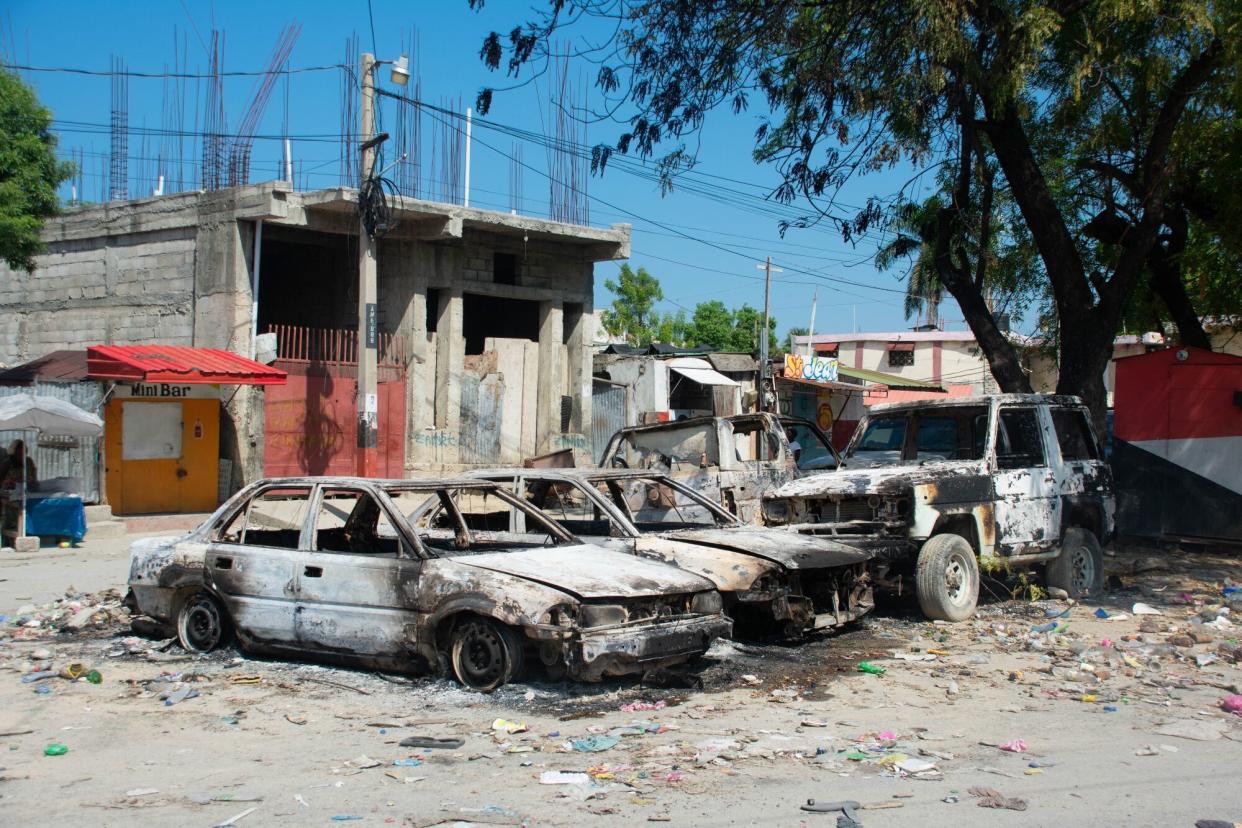Haiti’s PM Quits as Violent Gangs and Ex-Con Fight for Power

- Oops!Something went wrong.Please try again later.
(Bloomberg) -- Haiti Prime Minister Ariel Henry said he’s resigning, after weeks of chaos and violence loosened his grip on power and challenged Washington’s strategy for the poorest nation in the hemisphere.
Most Read from Bloomberg
Stock Traders Bracing for Worst Shrug Off Hot CPI: Markets Wrap
Ex-Wall Street Banker Takes On AOC in New York Democratic Primary
Trump Wins Republican Nomination, Setting Up Rematch With Biden
Henry said in a video statement Tuesday he would step down as soon as a transitional council is created. The council will then appoint an interim prime minister and prepare for elections.
“No sacrifice is too great for Haiti,” he said. “Haiti needs peace, Haiti needs stability.”
His statement came after the Caribbean Community, an intergovernmental group of 15 member states, and Haiti’s allies including the US met in Jamaica on Monday and outlined a roadmap for political transition in an attempt to stem the nation’s descent in lawlessness. Over the past two weeks, armed gangs besieged critical infrastructure in Haiti and forced the US military to evacuate non-essential personnel at the US embassy.
“Haitians deserve a country where children can go to school and their parents know they will be safe,” Guyana President Irfaan Ali said at a news conference late Monday. “We implore all parties, all stakeholders, all Haitians to be patient.”
Secretary of State Antony Blinken, who participated in the Caricom meeting, pledged an additional $100 million for the peacekeeping force waiting for deployment to Haiti.
Henry, who left Haiti on Feb. 25 to build support for a multinational security force led by Kenya, has been unable to return to the country, as gangs have attacked the capital and closed the main airport. A plane he was traveling in was denied access to the Dominican Republic — which shares the island of Hispaniola with Haiti — and landed in the US territory of Puerto Rico on March 5.
Read more: Haitian Gangs Torch Ministry as Political Violence Escalates
His resignation is a blow to Washington, which has been supporting him since 2021 in hopes that he would call for long-overdue elections. But that stance was challenged as gangs grew more powerful and violent, and elections never materialized. In the last few weeks, Haiti’s gangs have emptied prisons, burned police stations and laid siege to the international airport. More than 1,200 people have been murdered in 2024, and the UN estimates that about half the population is going hungry.
With the prime minister absent, other forces have tried to fill the vacuum. One political alliance involves former policeman Guy Philippe and ex-presidential candidate and senator Moise Jean Charles. Philippe was behind a 2004 coup and spent several years in US prison on money laundering charges.
Whoever takes charge will have to deal with the nation’s powerful gangs and its leaders. Jimmy “Barbecue” Cherizier, a former policeman who claims to have more than 1,000 armed followers, has become an increasingly vocal force in the country. Cherizier’s group, which includes other former policemen and child soldiers, has taken responsibility for some of the most brazen attacks, and has been warning that Henry’s return would spark a “civil war” and “genocide.”
Gangs now control about 80% of the capital and large swathes of the countryside.
The transitional council will include seven members from Haiti’s political organizations and the private sector, and two non-voting members from civil-society and faith-based groups. But crucially, those who face UN sanctions or have been charged, indicted or convicted in any jurisdiction, will be ineligible for president — in theory, sidelining Philippe and Cherizier.
Read more: How Violent Gangs Set Stage for Haiti’s New Crisis: QuickTake
Henry was swept into power in the wake of the 2021 assassination of President Jovenel Moise. While he enjoyed international backing, in Haiti he was often seen as an unelected autocrat who used the gang violence as an excuse to keep putting off elections.
Despite his unpopularity, Washington, the UN and others rallied behind him, short-circuiting other attempts to build a coalition government. The US has provided more than $5.5 billion to Haiti since 2010. Its $100 million pledge this week brings its total commitment to finance the Kenyan-led peace mission to $300 million.
--With assistance from Jenny Che.
(Updates with quote from Henry starting second paragraph and context throughout)
Most Read from Bloomberg Businessweek
Gold-Medalist Coders Build an AI That Can Do Their Job for Them
Academics Question ESG Studies That Helped Fuel Investing Boom
Luxury Postnatal Retreats Draw Affluent Parents Around the US
Primaries Show Candidates Can Win on TikTok But Lose at the Polls
How Apple Sank About $1 Billion a Year Into a Car It Never Built
©2024 Bloomberg L.P.


